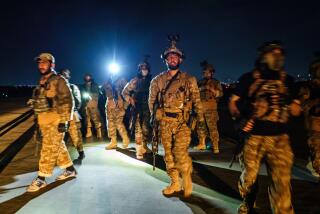Will Not Attack Kabul, Afghan Rebel Chief Says : Asia: Regime is considering ceding power to guerrillas. The military leadership may join alliance.
KABUL, Afghanistan — The leader of the Muslim rebel faction that helped drive Afghan President Najibullah from power last week pledged not to take the capital by force, as the besieged new regime said Sunday for the first time that it was considering the rebels’ demand that Kabul be ceded to a government drawn from the guerrillas.
And there were growing signs that the military leadership of the country and the more moderate guerrilla factions were forging a surprising alliance in an attempt to determine the shape of a new and peaceful Afghanistan.
After a second day of talks to deter an assault on Kabul, held with rebel leader Ahmed Shah Masoud inside his armed camp about 50 miles north of the city, Foreign Minister Abdul Wakil told reporters that the rebels’ call for a ruling council of moujahedeen, or holy warriors, “is not far from reality or possibility.”
The concession by Wakil, one of several ruling party leaders who joined with dissident senior military officers in forcing Najibullah from office, was an indication that the Soviet-installed regime that has ruled the nation for six years might not last long under its new caretakers.
But Masoud’s pledge to negotiate a peaceful transition of power and not to move on Kabul eased widespread fear of an imminent rebel assault on the capital, which, under the control of a council of military generals, was largely peaceful and slowly returning to normal Sunday after isolated instances of fighting spread panic through the streets the day before.
“I could have arrived in Kabul already, but I prefer to wait,” Masoud told Western journalists who met him inside a stronghold bristling with hundreds of armored personnel carriers, artillery pieces and thousands of fighters. “I am sure that the army in Kabul will not fight because we assured them we will not loot and we will not kill anybody.”
Masoud stressed that if his huge, combined force of Islamic rebels, former regime militias and regular army troops did enter the capital, “the defense belt would collapse immediately and a number of we moujahedeen will go into the city.” But Masoud, whose faction is considered one of the more moderate, said he is in contact with all other major moujahedeen factions to secure similar commitments not to attack the capital--including hard-line fundamentalist leader Gulbuddin Hekmatyar, with whom Masoud broke ranks many years ago. Hekmatyar has threatened to attack Kabul.
Outside the capital Sunday, the face of Afghanistan appeared to be transforming itself, as the regional war apparatus left behind by the ousted strongman Najibullah began dissolving and islands of temporary peace began appearing.
In city after besieged city, generals of an army once led by committed Communists shook hands with Muslim guerrilla commanders they had fought bitterly for 13 years and began negotiations to form interim ruling councils.
By the end of the day, it appeared that virtually every major city was on the brink of being jointly held by forces from both sides of the conflict. The first public indication that all these fast-moving events were part of a larger plan was seen Sunday evening on Kabul Television. With the camera focused on a reel-to-reel tape recorder, the state-run television broadcast a recorded conversation between senior officers in Kabul and the military commander in the strategic southeastern city of Gardez.
In that city, the broadcast explained, a Lt. Gen. Imamuddin of the Afghan army walked arm in arm Sunday with one of the top rebel commanders, Jallaluddin Haqqanin, whose forces have besieged the strategic city for nearly a year.
“Everything is going according to plan,” Imamuddin said on the tape. “The council should be in place by Monday.”
Similar councils were being formed in the southern city of Kandahar, the nation’s second largest, and in many provinces throughout the south. The 11 northern provinces are already under the control of Masoud’s loosely knit coalition of rebel and former regime forces.
“It’s snowballing,” said a European diplomatic expert in Kabul. “They all just want to stay alive.”
Most senior officers and diplomatic analysts in Kabul saw the process as an encouraging sign of true reconciliation between two heavily armed forces that are tired of war.
“There will be a lot of small incidents,” the European expert added, “but I think it’s going well so far.”
Najibullah, the pro-Moscow Communist dictator who ruled this country for the last six years, was ousted Thursday by a group of as many as 45 of his disaffected generals, with the support of some of the more moderate guerrilla leaders. After being stopped at Kabul airport as he attempted to flee the country, Najibullah took refuge in a U.N. compound in the capital, where he has remained since.
The state-run radio announced Sunday that former Vice President Abdul Rahim Hatif had taken control of the government, but it was not known how much real power he might wield. When Najibullah was first ousted, it was announced that the government would be run by four of his vice presidents, but most observers said the generals continued to run things.
Kabul governor Karim Baha, a senior military officer who is among the core group of generals overseeing the nation’s security during the transition, expressed confidence that hard-liners among all factions are increasingly being isolated through the process.
More to Read
Sign up for Essential California
The most important California stories and recommendations in your inbox every morning.
You may occasionally receive promotional content from the Los Angeles Times.










